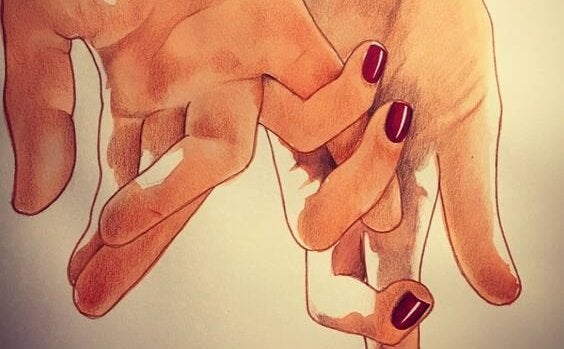There are lovers who in their relationships act almost like real snipers, one of their most common strategies is to place a magnifying glass on the couple to point out their faults, mistakes and supposed weaknesses, is the paradigm of the coward, of the person who does not understand that in love, more than magnifying glasses, we need mirrors.
As for affective relationships, no one can fly the flag of absolute wisdom. Most of us have ridred more than once of the precipice of mistakes, full of dreams and hopes, shipwrecked in the ocean of impossible loves and also cowardly passions, those to which we do not abandon ourselves out of fear or mere indecision.
“Behavior is a mirror where everyone shows their image. “Goethe?
There is a type of relationship that often wreaks more havoc than any other: when a couple, or even both, act as true deconstructors of identity, it is these profiles that focus your attention on everything that does not please or annoy the couple, in order to objectify, ridicule and control the spouse. They do it because that’s how they take the reins, how they manage to make up for their hurt self-esteem.
Almost without realizing it, we are trapped in a hamster wheel, where inertia itself overwhelms us, dilutes us and encloses us in a dangerous dynamic of doom. A dynamic where those who always carry a magnifying glass in their hand are unable to look in the mirror to discover its chasms, its abyss of immaturity.
Howard Markman is a professor of psychology at the University of Denver and one of the most recognized researchers in relationships, in the publishing market we have a lot of books by this professor that illustrate with precision and originality many of the emotional problems that arise. in daily life.
One of the most interesting ideas explained by Dr. Markman is that most people who are in couples therapy are convinced that the spouse has full responsibility for the problems and misfortune they have. Do you think the therapist will “cure” them? or more precisely, “cure them”, the bad behavior of their partner. They usually expect the professional to give them a reason and ask their partner to pull their ears for your bad behavior.
However, behind a partner problem, there are usually no mental health problems, but there may be a problem in the dynamics of the relationship, a dynamic that was built by the two partners, through their relationship.
For Dr. Howard Markman, complaints in the office about the couple are often associated with some gaps in emotional education and psychological skills, so it is proposed that, from an early age, a specific area called “psychoeducation” be introduced. in the school’s curriculum.
The goal of psychoeducation would be to provide strategies, tools and skills to help us, so it would be a matter of learning to look in the mirror to identify one’s own fears, insecurities and eliminate all the rigid roles and gender patterns imposed by society. .
We cannot forget, for example, that when it comes to love there are those who get carried away by these pre-made patterns, inherited from their families, where do they assume it is? Better shut up and hold on a little longer? What? On the contrary. I do what I want or I don’t like, I get angry and impose on me because I’m the one in charge?
It is necessary to have a knowledge of oneself to take care of oneself and contribute with our best version and strengths to the success of relationships.
In this rich, complex and growing context of emotional relationships there is always room for conflict, far from seeing them as something negative, as well as the virus that can give rise to a disease, we must assume them as an engine that will allow us to know each other better to create a much stronger bond, a more resistant fabric.
Conflicts move the most sensitive fibers of our being, but we often do so by placing the magnifying glass on each other’s supposed flaws in an almost obsessive and delusional way. Do we do this without being aware of ours? Emotional responsibility quota, without realizing that sometimes we go through life so naked and so cold that all we want is for someone to be our clothes, a shelter without cracks, a second skin capable of healing all wounds.
However, this formula never works. He who acts as a “donor”, who feels useful only when necessary, is anchored in a relationship of dependence, in that hamster wheel that we talked about at the beginning where sooner or later we will lack air, life and dignity. Is there always to serve you will live under this demanding magnifying glass that seeks absolute perfection to nurture the voids and needs of others?Worse, you’ll never be satisfied.
We need to stand in front of the mirror to meet ourselves and our self-esteem. Do not let yourself be dragged into this territory where the price of being loved is the very misfortune.

